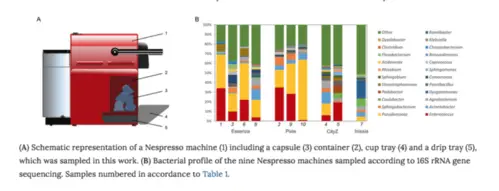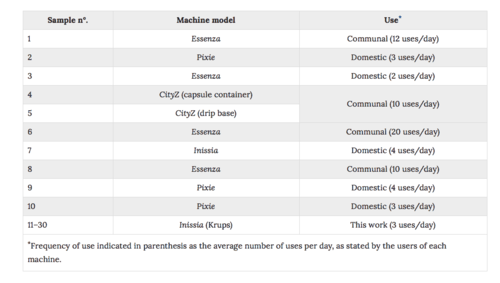Let’s talk about safety and health, which concern us all – or should – and are often threatened by unfounded news or opinion trends. One of them points directly to capsule coffee machines (taking advantage of the fact that they have become very fashionable in recent years) and questions their safety and health levels.
To refute this, a group of researchers have experimented and published their findings in a study with considerable media coverage. You can read the full study published here: Bacteria formation in household coffee machines – Article on Nature.com
Based on experiments with ten Nespresso coffee machines used over a year, the study leaves no room for doubt: capsule coffee machines present no health problems different from any other type of coffee machine.
Based on the analysis of these ten machines, some used in a domestic environment (few users) and others in an office (many different users), the researchers analysed the coffee residues that accumulated over time and extracted the DNA sequence from them.

This graph, extracted from the study, shows which organisms have been found and were in the coffee maker. Scientists call it the Bacteriological Profile.
According to this study, most bacteria accumulate in the waste collection compartment or from used capsules. Therefore, it is a space that we should not only empty but clean frequently. And avoid direct contact with the liquids we find there. Researchers recommend always washing your hands after cleaning these deposits of used capsules as a precaution.
Another very interesting finding reveals by Manuel Porcar (head of the research team). The number of bacteria and microorganisms found in the coffee grounds does not vary substantially with the number of uses of the coffee machine.
“The type and amount of bacteria do not differ according to the number of coffees made by the machine. A similar broth, consisting of diluted coffee from dripping capsules and water, has been found in all coffee machines’.
In other words, we must pay the same attention to cleaning a very used coffee machine as one we use only occasionally. The possibility of bacteria formation is similar in both cases.
The table below shows the specific models of Nespresso coffee machines that the researchers used in the study:

In the right-hand column (Use), you can see where the coffee machine has been used (in a private home, workplace, or public with several users). Please note that the experiment has been running for one year. As we can see, the most popular Nespresso coffee machines were used: the Essenza, the Inissia, the CitiZ and the Pixie.
Are capsule coffee machines safe? Of course, they are. At least as safe as other coffee makers. Capsule coffee machines are entirely safe (and healthy). Bacteria can only grow if they are left uncleaned for a long time, without picking up the residues or rinsing the components that come into contact with milk or the remains of used capsules—nothing to worry about if we follow the standard and minimal cleaning guidelines.
Are the coffee capsules safe?
On the other hand, apart from the safety of coffee machines, the debate about the alleged carcinogenic elements that coffee capsules can contain has become very fashionable in recent years.
These claims about cancer-causing coffee capsules can only be described as sensationalist and have already been refuted by many sources. The only explanation is to take advantage of trends or products in fashion (as has happened with the coffee capsule boom) and generate social attention by spreading hoaxes of this kind.
Many consumer organisations have taken it upon themselves to deny this absurdity with strong arguments (fundamental for us but sometimes unknown to the general public) related to the coffee machines’ pressure and the materials that the capsules are made of.
Neither have they been banned in Germany, nor do the coffee capsules cause cancer, nor do they contain substances that will harm your health or anything of the sort. All this is a lie spread on the Internet.
It is true, although it has nothing to do with this false rumour, that coffee contains an element, furan, which is potentially carcinogenic in specific quantities, and experiments on laboratory animals. But furan appears during the coffee roasting process and can, therefore, be present in capsules, coffee beans and ground coffee.
Furan is not exclusive to coffee: we can find it in fried meats, toasted bread, French fries, and in general, any food susceptible to being roasted or subjected to very high-temperature processes. It is a chemical and liquid component that appears naturally.
It is also true that coffee capsules, being hermetically sealed, prevent these chemical elements’ evaporation and natural dissipation. They can retain a higher quantity of furans than air-packed coffee.
No one should be alarmed. George Clooney can rest assured.

The furan levels present in roasted coffee are far from harmful to health. To begin to be considered dangerous, according to these studies (which you can consult here: studies on the concentration of furan in coffee), a person should drink 30 cups of coffee every day. And in that case, maybe caffeine and other excesses should concern you even more than furan.
So first and foremost, peace of mind and useful information.
